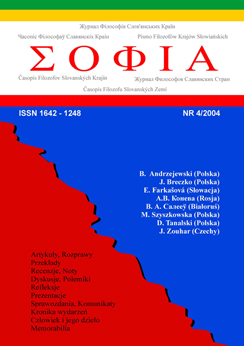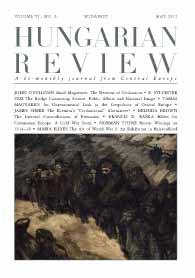
Jak jest możliwe wychowanie moralne?
Book Review: Stanisław Gałkowski, Rozwój i odpowiedzialność. Antropologiczne podstawy koncepcji wychowania moralnego, Wydawnictwo KUL, Lubłin 2003, ss. 268
More...We kindly inform you that, as long as the subject affiliation of our 300.000+ articles is in progress, you might get unsufficient or no results on your third level or second level search. In this case, please broaden your search criteria.

Book Review: Stanisław Gałkowski, Rozwój i odpowiedzialność. Antropologiczne podstawy koncepcji wychowania moralnego, Wydawnictwo KUL, Lubłin 2003, ss. 268
More...
Book Review: Šlomo ben Gabriola: Koruna Kráľovstva, preklad D. Goldstein a M. Mičaninová, vyd. M. Vaška, Prešov 2003, s. 87 vrátane predslovu
More...
Recent years have seen a number of naturalist accounts of mathematics. Philip Kitcher’s version is one of the most important and influential. This paper includes a critical exposition of Kitcher’s views and a discussion of several issues including: mathematical epistemology, practice, history, the nature of applied mathematics. It argues that naturalism is an inadequate account and compares it with mathematical Platonism, to the advantage of the latter.Recent years have seen a number of naturalist accounts of mathematics. Philip Kitcher’s version is one of the most important and influential. This paper includes a critical exposition of Kitcher’s views and a discussion of several issues including: mathematical epistemology, practice, history, the nature of applied mathematics. It argues that naturalism is an inadequate account and compares it with mathematical Platonism, to the advantage of the latter.
More...
The paper addresses the problem whether arts, sciences and humanities can be regarded as useful. First it examines the means-ends relation and argues that some means are not causally but rather constitutively connected to ends. Second, it specifies two dimensions along which the problem of values will be addressed. One is the issue about the relation between values and desirability, the other is the active and affective conceptions of valuation. Third the paper offers a concise reconstruction of the answers to the question of usefulness formulated during the enlightenment. It will be argued that traditionally usefulness was understood causally and not on the individual, but rather on the social level. In the final section the paper contends that values should be understood in terms of activities rather than in terms of desire satisfaction and that this interpretation can bring us closer to answering the question whether and why arts and sciences are useful.
More...
Arguments for and against social equality have been advanced on various grounds, but the central issue remains to what extent, if at all, the pursuance of social equality should be seen as morally binding. Why should it be incumbent upon everyone to treat it as a moral virtue? The paper considers some of the best known egalitarian views and argues that the case for equality as a morally binding principle has not been made.
More...
I claim that there are four major strands of argument for externalism and set out to discuss three of them. The four are: (A) That referential thoughts are object-dependent. This I do not discuss. (B) That the semantics of natural kind terms is externalist. (C) That all semantic content, even of descriptive terms, stems from the causal relations of representations to the things or properties they designate in the external world. (D) That, because meaning is a social product and no individual can capture the whole social practice that defines a concept, what the speaker means always outruns what he can know. I briefly discuss (C) and (D) and conclude that they cannot be correct, because, if they were, the content of every thought would permanently transcend the reflective grasp of all thinkers. Then I discuss (B) and conclude that, though Putnam shows something interesting about natural kind terms—namely that a real verbal definition requires science—this has none of the con-sequences for philosophy of mind that it is normally supposed to have.
More...
This article focuses on those Estonian male migrants to ‘Old Europe’ who spend most of their time in the domestic realm as caring fathers and supportive spouses to their wives, who are meanwhile advancing their transnational careers. In this context, masculine identity talk can be understood in terms of strategies employed in response to the challenge to the men’s masculinity that this atypical life choice is likely to entail. Identity is viewed in this article as a phenomenon that is relentlessly, although not always deliberately, (re)formulated in discourse, rather than determined by the assigned social roles. Analysis of in-depth interviews reveals that there are varied discourses in use that efficiently reconstruct the interviewees’ sense of personal significance. Interestingly, men predominantly combine ‘alternative’ discourses (‘caring father’, ‘supportive spouse’, ‘civilised adult’), which potentially undermine Estonian idealised masculinity, with the ‘conservative’ discourses (‘professional man’, the ‘well-off’), that reinforce the Estonian male norm. Men draw on a range of potentially oppositional and conflicting resources for constructing masculinity, without much reflexive selection from their part. Hence, the discourses men engage in position the men as much as the men appear to consciously position themselves in the discourses. This poststructuralist account of identity is located within a more structural historical context of transition and change in contemporary Europe.
More...
This article examines the effect of the Transnistrian area on Moldova-Russia relations. David Lake’s concept of hierarchy will be used as the theoretical framework. The article examines why Russia’s mechanisms of influence should not be seen as a reflection of a hierarchical relationship between Russia and Moldova. The article begins by explaining why this work has chosen a hierarchical framework and a brief introduction of Transnistria. This is followed by two sections of analysis: security and economy. These two sections will also contain subsections on events that highlight the hierarchical nature of the Moldova-Russia relationship. This article shows that Russia clearly has a hierarchical relationship with Moldova. David Lake’s theory proves to be a useful tool in understanding Moldovan-Russian relations.
More...
A Cat’s Lick: Democratization and Minority Communities in the Post-Soviet Baltic by Timofei Agarin, 2010, Amsterdam, N.Y: Rodopi
More...
This article aims to map formal adult education in terms of the determinants of educational upgrading later in life, relating these back to social inequalities from a comparative perspective, and to labour market outcomes following participation, particularly the probability of being employed. It relies on a longitudinal analysis of data from the United Kingdom, Spain, Sweden and Russia. Results show that educational upgrading at mature ages has the potential for reducing social inequalities in all the countries analysed. Upgraders tend to come from a medium to low education background in Russia and the UK but from the tertiary educated in Spain and Sweden. Labour market marginalisation increases the chance of upgrading particularly in Sweden. Upgrading tends to increase employment opportunities, though these are in some cases conditional on being employed whilst studying. This is specifically the case for Russia and for men in the UK. We also found important country-specific gender differences in the effect of upgrading on employment opportunities, according to which women benefit more than men in the UK and Sweden. We conclude with some suggestions about the institutional effects that produce differences between countries.
More...
Before exploring the selectivity of educational attainment in detail, this article extensively describes the contours of educational systems in Central and Eastern European (CEE) countries. These countries provide an interesting setting in view of their post-secondary education expansion and differentiation, as well as their variation in the degree of vocational orientation at the secondary level. Drawing on high quality, national micro data, we find that students from disadvantaged family backgrounds who manage to enter post-secondary education are ʽdivertedʼ to second-tier post-secondary institutions, while long-term university programs are more likely to be dominated by students whose parents have an academic background. At the secondary level, we confirm the patterns of negative selection among students from lower social backgrounds into lower vocational programs. This diversion effect at the secondary level is especially pronounced in CEE countries that inherited a strong secondary vocational system and reinstalled early tracking.
More...
The paper addresses the remembrance of events surrounding the restoration of Lithuanian independence, as well as their repercussions on the present, concentrating on the younger generation that does not have first-hand experience of the period and, therefore, has to rely on other people’s accounts, textbooks, and other sources. If one considers the state and, especially, its social (or communal) dimension as impossible totalities, memory and history acquire significant importance as they both provide ‘a magma of significations’, out of which particular signifying structures are instituted in order to anchor meaning and exhort a unifying claim through dominant narratives that tend to subjugate the otherwise inevitable variety of discourses. The discourse of the Lithuanian history textbooks is analysed by outlining its emphasis on unity and self-sacrifice in 1988-1991, and by portraying the Lithuanian history as an unending struggle against enemies and their malevolent plots. Also, considering the accounts of young people, two tendencies are visible: first, a bias towards images of unity and self-sacrifice depicting the period concerned, second, the predilection to employ the categories of ‘aliens’ and ‘enemies’ is evident, significantly affecting perceptions of the present with widespread images of disintegration and decay in the absence of the Other.
More...
Friendship. Seemingly a simple matter. After all, it does not require more than two people. Hence friendship is “as simple as ABC”, one would think.
More...
Historians investigating the causes of World War II seldom return to the treaty that made the beginning of hostilities possible: to the German–Soviet pact of 23 August 1939. This so-called “non-aggression” agreement sometimes referred to as the “Molotov–Ribbentrop Pact” was sprung upon the Western powers as an unpleasant surprise; it also rocked all communist parties outside the USSR the propaganda of which had earlier been uncompromisingly anti-Fascist. While the shock might have been partly forgotten after Hitler’s attack on the Soviet Union in June 1941, one thing remains certain: Hitler would not have dared to attack Poland and start World War II had its Eastern flank not been secured by the agreement with Stalin.
More...
Arts and Artists in World War I: the title alone of the exhibition, held at the Vaszary Villa in the town of Balatonfüred between October 2014 and January 2015, was intended to convey the scope and variety of the works on display in terms of genre, underlying motivation, and even of aesthetic standards. Paintings, scale models of memorials, memorial medals, tablets, works on paper, photographs and posters all shared space here, if not directly back to back, but scattered across a number of exhibition rooms loosely communicating with one another inside the same building.
More...
The critical information that sealed the fate of Nazi Germany came from a team of fewer than six young civilians crowded in a small room in a ramshackle government building a few blocks from the White House. The youngest who called himself a mathematician had just finished high school; another was a graduate student in love with the Japanese language but had never visited Japan. Together they cracked the Japanese diplomatic code and deciphered the daily reports of Japan’s ambassador in Berlin sent to Tokyo. A committed Nazi and a retired general, Baron Hiroshi Oshima was a darling of German leaders, probably the only foreigner Adolf Hitler trusted. Oshima spent several days visiting the fortifications the Germans built to block an Allied invasion. Apparently, the Germans withheld nothing from him and he reported everything to his government.
More...